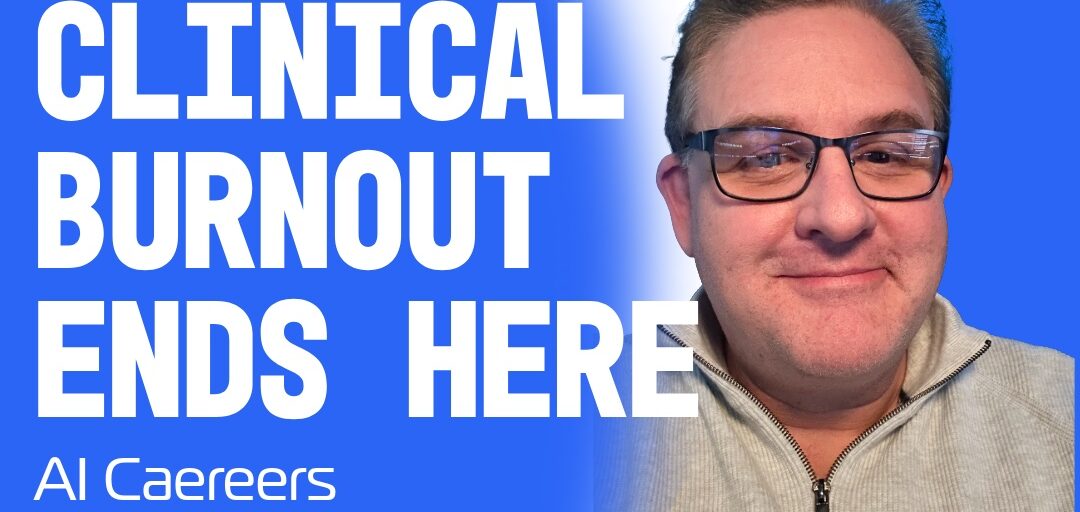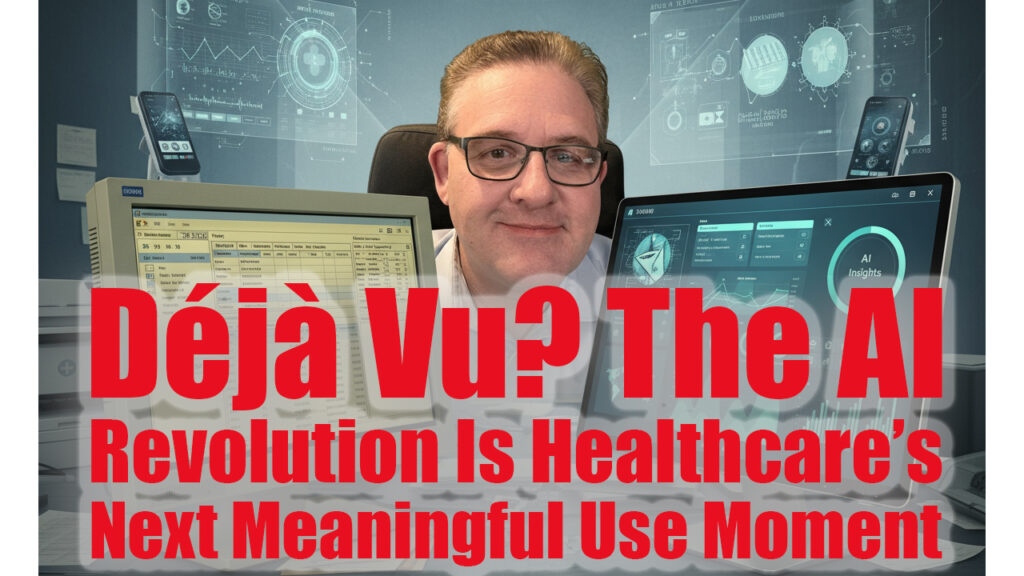When I told my family and friends I was leaving my secure bedside nursing position for a digital health role, they thought I’d lost my mind. “You’re throwing away everything you worked for,” they said. “You’ll forget your clinical skills. What happens when digital health turns out to be just another fad?”
I was terrified they were right. I’d spent years building clinical expertise, and the thought of losing those hard-won skills kept me awake at night. What if I needed to return to bedside nursing someday? What if all that training and experience just… evaporated?
Here’s what actually happened: my clinical knowledge didn’t disappear when I left the bedside—it became the most valuable asset I possessed. The credibility I’d built through thousands of patient interactions, the workflow understanding I’d developed during countless shifts, the safety instincts I’d honed in critical situations—none of that went away. Instead, it transformed into something healthcare technology desperately needs but rarely finds: authentic clinical insight that can’t be faked.
The Credibility Crisis in Digital Health
The digital health industry has a problem that money can’t solve: technology companies don’t understand how healthcare actually works. They build elegant solutions that fail spectacularly when they meet real clinical workflows. They promise transformative tools that clinicians reject because the designers never spent a 12-hour shift trying to keep patients alive while documenting everything in triplicate.
Dr. Nate Favini discovered this truth when he transitioned from internal medicine to become Chief Medical Officer at Forward, a San Francisco digital health startup. In interviews, he describes the role as “doctoring at a larger scale”—using technology to help entire populations rather than one patient at a time. But the reason Forward recruited him wasn’t his technology skills. It was his clinical credibility. As one Johns Hopkins professor observed about the surge of physicians joining tech companies: “We’re seeing a lot of chief medical officers coming on board to grant that clinical, medical legitimacy to whatever products people are developing.”
That word—legitimacy—is everything. You can’t fake clinical credibility. You can’t hire a consultant to give you ten years of bedside experience. You can’t acquire the instinct that tells you when a workflow will fail or when a safety issue is lurking in supposedly “innovative” technology.
Why Clinical Skills Don’t Disappear—They Multiply
My fear that leaving bedside nursing would erase my clinical expertise was completely backwards. What actually happened was that every clinical skill I’d developed became more powerful, not less.
The critical thinking that helped me spot early signs of patient deterioration? That’s the same thinking that now identifies flaws in AI algorithms before they reach patients. The communication skills I used to explain complex medical situations to anxious families? Those skills translate directly to bridging the gap between technical teams and clinical staff who fear technology changes.
The workflow knowledge I gained from actually doing the work—not reading about it in policy manuals—became my superpower in digital health. I could spot implementation failures before they happened because I’d lived the reality of how healthcare actually operates when the hospital is short-staffed, the patient is complex, and the EHR is fighting you at every step.
Consider the example from London, where a hospital recently advertised for an “EPIC nurse”—a nurse with expertise in Epic EHR systems—with a salary of £100,000. That’s five to six times what a typical NHS nurse earns. Why such a premium? Because boundary-spanning staff who understand both clinical care and technology systems have become critical success factors for digital transformation. Studies during COVID-19 showed that healthcare organizations with dedicated clinical informatics leaders—nurses and doctors given formal time for digital projects—were far more successful at scaling telehealth, electronic records, and AI tools than organizations that treated technology as purely an IT concern.
These roles didn’t eliminate clinical skills—they multiplied their value exponentially.
The Protection Instinct That Makes You Essential
Here’s something the technology industry struggles to understand: clinical professionals will always work to protect their patients and the care environment. This protective instinct is exactly what makes us skeptical of new technology—and exactly what makes our involvement in digital health essential.
When I work on AI implementation projects now, the biggest resistance always comes from clinical staff. Not because they’re afraid of change or stuck in old ways, but because they’re protecting patients from potentially dangerous technology deployed by people who don’t understand the clinical context. That resistance isn’t a bug—it’s a feature. It’s the same instinct that catches medication errors, questions unsafe orders, and advocates for patients when systems fail them.
Dr. Dale Bramley, a public health physician who became CEO of New Zealand’s national health authority (Health NZ) in mid-2025, exemplifies how clinical credibility translates to digital health leadership. Digital health leaders across New Zealand welcomed his appointment specifically because of his clinical background and his support for data-driven innovation. His medical training didn’t become irrelevant when he moved into health system leadership—it became the foundation for making technology decisions that actually serve patient care rather than just technical objectives.
The paradox is this: the clinical credibility that makes you cautious about unproven technology is the same credibility that makes you invaluable to digital health implementation. Healthcare organizations need professionals who will ask hard questions, identify safety risks, and ensure technology serves patients rather than just impressive demonstrations.
From Fear to Freedom: What Really Happens to Your Skills
Let me tell you what actually happened to my clinical skills after leaving bedside nursing:
Pattern Recognition Got Sharper: Instead of recognizing deterioration patterns in individual patients, I now spot systemic problems across entire healthcare organizations. The diagnostic thinking didn’t disappear—it scaled.
Safety Awareness Expanded: Rather than catching errors for six patients per shift, I now design systems that prevent errors for thousands of patients daily. The vigilance remained—the impact multiplied.
Communication Became Translation: The ability to explain complex medical situations to anxious families evolved into translating between technical developers and clinical staff who speak completely different languages. The core skill stayed the same—the application expanded.
Clinical Judgment Became Strategy: The decision-making skills used at the bedside now inform strategic choices about which technologies to implement, how to deploy them safely, and when to pause implementations that aren’t ready. The judgment didn’t vanish—it found new expression.
The Digital Health Reality Nobody Warned Me About
Here’s what my well-meaning family and friends got completely wrong: digital health isn’t a fad that might disappear, requiring me to scramble back to bedside nursing. Digital health has only ever grown because it’s tightly bound to healthcare’s growth. It’s now part and parcel with healthcare delivery itself.
Think about it: Can hospitals function without electronic health records anymore? Can healthcare systems operate without telemedicine capabilities after COVID-19 proved their necessity? Can modern medicine advance without the data analytics and AI tools that are transforming diagnosis and treatment? The answer to all these questions is no.
Digital health isn’t separate from healthcare—it IS healthcare now. The Australian government’s 10-year National Digital Health Blueprint (2023-2033) explicitly calls for a “digitally empowered workforce.” The UK’s NHS has set targets for foundational electronic records across providers by March 2025 as part of the national plan to “digitise, connect and transform” care. Every developed healthcare system worldwide is accelerating digital transformation, not slowing it down.
The secure bedside job I was so afraid to leave? That job is becoming increasingly dependent on the very digital health skills I was worried about pursuing. The “risky” career choice is actually the future-proof one.
The Bridge That Healthcare Desperately Needs
The real revelation came when I realized that clinical professionals aren’t leaving healthcare when we move into digital health—we’re becoming the essential bridge that makes healthcare technology actually work.
Without clinical credibility, technology implementations fail. Vendors promise elegant solutions that crumble when they meet clinical reality. IT departments build systems that make clinical workflows harder rather than easier. AI algorithms optimized for technical metrics miss the nuances that matter for patient safety.
This is why healthcare organizations are scrambling to appoint Chief Medical Information Officers (CMIOs), Chief Nursing Information Officers (CNIOs), and clinical advisors for digital projects. In the US, over 50 health systems now employ Chief Digital Officers to drive transformation, many of them physicians or nurses by background. Australia’s Digital Health Agency deliberately appointed both a doctor and a nurse as Chief Clinical Advisors to steer national projects. The NHS encourages every trust to appoint senior clinical staff to lead informatics and digital change.
These aren’t token positions—they’re recognition that clinical expertise is the foundation upon which effective healthcare technology must be built.
What This Means for Your Journey
If you’re sitting where I was—afraid that leaving clinical practice means abandoning everything you’ve worked for—let me offer a different perspective: your clinical credibility is about to become more valuable than it’s ever been.
The AI implementation wave is following exactly the same trajectory that electronic patient records did back before 2008. The technology has rough edges. People think it might be a passing fad. Adoption is currently voluntary but will certainly become mandated. Clinical professionals are resistant because they’re protecting patients and the care environment.
This is where clinical credibility becomes everything. You can’t fake the experience of managing complex patients. You can’t manufacture the judgment that comes from thousands of clinical decisions. You can’t shortcut the trust that clinical staff give to someone who’s lived their reality.
Your clinical skills won’t disappear when you move into digital health—they’ll become the rare commodity that makes technology transformations succeed or fail.
The Choice That Defines Your Future
You can stay at the bedside, where your clinical expertise serves the patients directly in front of you. There’s nobility in that choice, and healthcare will always need dedicated bedside clinicians.
Or you can discover that your clinical credibility has value far beyond what traditional nursing or medical practice suggests. You can become the bridge that helps technology serve patients at scale. You can use your hard-won expertise to design systems that protect thousands of patients from harm. You can prove that moving into digital health doesn’t mean leaving healthcare—it means transforming it.
The people who told me I was crazy to leave bedside nursing were wrong about everything. My clinical skills didn’t disappear—they became my competitive advantage in a field desperate for authentic clinical insight. The “risky” career move turned out to be the most secure choice I could have made.
Your clinical credibility is your superpower. The only question is whether you’re ready to discover just how powerful it really is.
If you’re wondering whether your clinical expertise could translate into digital health impact, let’s talk. The bridge between bedside care and healthcare transformation needs professionals who understand both sides—and that might be exactly who you already are.
References
[1] Hoover, A. (2025). Doctors in the C-suite: Burned-out physicians are ditching the operating room for the board room. Business Insider. https://www.businessinsider.com/burned-out-doctors-reinventing-careers-tech-cmo-roles
[2] HealthManagement.org (2021). Why all healthcare organizations need digital health leaders. https://healthmanagement.org/c/digital/issuearticle/why-all-healthcare-organisations-need-digital-health-leaders
[3] BMJ Future Health Conference Program (Nov 2025). New directions for clinicians: From bedside to digital leadership. https://future.bmj.com/content/conference-programme
[4] Australian Digital Health Agency – Media Release (Aug 2024). Agency appoints first Chief Clinical Adviser (Nursing). https://www.digitalhealth.gov.au/news-and-events/news/agency-appoints-first-chief-clinical-adviser-nursing
[5] NZ Herald (Jun 2025). Dr Dale Bramley named Health NZ chief executive. https://www.nzherald.co.nz/nz/dr-dale-bramley-named-health-nz-chief-executive
[6] Wolters Kluwer Expert Insights (Mar 2024). What does Australia’s digital health vision mean for nurses? https://www.wolterskluwer.com/en-au/expert-insights/what-does-australias-digital-health-vision-mean-for-nurses
[7] NHS England (2022). Plan for Digital Health and Social Care. https://www.england.nhs.uk/publication/a-plan-for-digital-health-and-social-care/




